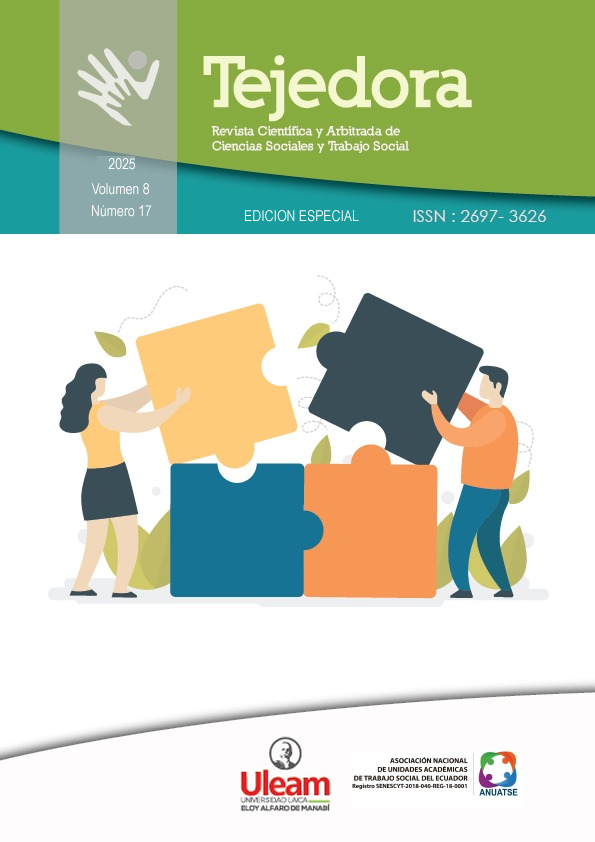COLLABORATIVE LEARNING TO PROMOTE ACADEMIC PERFORMANCE IN STUDENTS WITH SENSORY DISABILITIES
DOI:
https://doi.org/10.56124/tj.v8i19.017Keywords:
collaborative work, sensory disability, academic performanceAbstract
This research aimed to analyze the effect of collaborative learning on the academic performance of students with sensory disabilities. Using a quantitative approach and a quasi-experimental design, the instruments used were a pretest to observe baseline academic performance and a posttest after the research to determine how students' collaborative learning had improved. The sample was formed using a convenience method. The sample consisted of six students with sensory disabilities from the Distance and Online Education Unit.. Knowledge pretests and posttests on ACS were conducted, alongside a questionnaire outlining the principles of collaborative learning, all of which were examined through descriptive analysis. It is important to note that the pretest yielded an overall mean below 50%, indicating the need for collaborative strategies; the posttest, in turn, showed a 2 % increase in scores, with a high probability (99 %) that participants would acquire greater knowledge of ACS and its application. The questionnaire reflected the principles of collaborative work: individual and team accountability, positive interdependence, team internal assessment, team management, and promotive interaction, with team management and promotive interaction identified by students as the most relevant. Ultimately, collaborative learning demands the strengthening of collaboration competencies to foster the participation of all students and promote academic success.
Downloads
References
Navarro, R. E. (2003). El rendimiento académico: concepto, investigación y desarrollo. REICE. Revista Iberoamericana sobre calidad, eficacia y cambio en educación. DOI: https://doi.org/10.15366/reice2003.1.2.007
Jiménez González, A., & Robles Zepeda, F. J. (2016). Las estrategias didácticas y su papel en el desarrollo del proceso de enseñanza aprendizaje. Revista EDUCATECONCIENCIA, 9(10), 106–113. https://doi.org/10.58299/edu.v9i10.218
Roselli, N. (2016) El aprendizaje colaborativo: Bases teóricas y estrategias aplicables en la enseñanza universitaria. Universidad de San Ignacio de Loyola. Propósitos y Representaciones, 4(1), 219-280. doi: http:// dx.doi.org/10.20511/pyr2016.v4n1.90
García, C. E., & Sánchez, A. S. (2001). Clasificaciones de la OMS sobre discapacidad. Boletín del RPD, 50, 15-30. https://sid-inico.usal.es/idocs/F8/ART6594/clasificacion_oms.pdf
Retamozo, B. I. M. (2024). Promoción de la accesibilidad para personas con discapacidad a través de las TIC: perspectivas educativas. Epistemia Revista Científica, 8(1), 41-51. DOI: https://doi.org/10.37843/rted.v11i1.204
Calderón-Delgado, E. I., Jácome-Achi, S. S., Chalá-Quilumba, A. M., & del Pilar Villavicencio-Guambo, R. (2024). Accesibilidad digital: El impacto de la tecnología en el aprendizaje de estudiantes con discapacidades [Digital accessibility: The impact of technology on learning for students with disabilities]. Revista Multidisciplinaria Perspectivas Investigativas, 4(especial), 1-10. DOI: https://doi.org/10.62574/rmpi.v4iespecial.234
Martínez, O. (2019). Consideraciones Epistemológicas. Revista Scientific, 4(11), 7-25, ISSN: 2542-2987. Barinas, Venezuela: Instituto Internacional de Investigación y Desarrollo Tecnológico Educativo - INDTEC.
Gómez, J. A. S. (2018). Experiencia de un alumno con discapacidad visual en el Sistema Educativo Español. Revista de educación inclusiva, 11(2), 117-138.
Fernández, M. (2012). Discapacidad visual y técnicas de estudio.
Secretaria de Educación, Gobierno del estado de Yucatán. (2021) Tomo 3, Discapacidad Auditiva. Colección juntos trabajamos por la inclusión. México.
Barboza, Luis., Romero, R., Rodríguez, C., Romero, N. (2022) Universidad del Zulia. Programa de aprendizaje colaborativo para mejorar los niveles de inclusión educativa Espacio Abierto, vol. 32, núm. 1, pp. 138-154..
Gómez, G. M. (2011). Metodología. Girardot, Cundinamarca, Colombia.
Rodríguez Fuentes, Antonio. (2020) Discapacidad y Educación. Revista RETOS XXI. Vol. 4 Núm. 1
Osalde, Ma, Eugenia. (2015) El aprendizaje colaborativo y el aprendizaje cooperativo en el ámbito educativo. Universidad Mexicana.
Gabriela, B. Q. B. (2022). Propuesta de aprendizaje colaborativo en aulas de estudiantes con discapacidad auditivas y visual” Ecuador-PUCESE-Escuela Ciencias de la Educación–Educación Básica.
Luque Parra, Diego. (2013) Necesidades Específicas de Apoyo Educativo del alumnado con discapacidades sensorial y motora Specific Needs of Learning Support pupils with sensory and motor disabilities. Departamento de Psicología Evolutiva y de la Educación, Universidad de Málaga. Instituto de Salud Carlos III y Universidad Complutense de Madrid. Summa Psicológica Ust. ISSN 0718-0446.
Aguilar Rojas, E. G., & González Roque, J. (2017). El trabajo cooperativo como estrategia didáctica para la inclusión en el aula.
Pérez, M. M., & Sánchez, T. (2012). 5. Trabajo colaborativo en el aula: experiencias desde la formación docente. Revista EDUCARE-UPEL-IPB-Segunda Nueva Etapa 2.0, 16(2), 93-118.
Francisco, D. P. I., Alfredo, B. S. L., & García, H. C. (2021). El Aprendizaje colaborativo como estrategia didáctica en América Latina. Tecno Humanismo.
Calzadilla, M. E. (2002). Aprendizaje colaborativo y tecnologías de la información y la comunicación. Revista Iberoamericana de educación, 29(1), 1-10.
SUMMA La Caixa (2019) Orientaciones para la Formación Docente y el Trabajo en el aula: Aprendizaje. Primera edición.
De la Cruz, M. A. T., Macías, G. G. G., Viejó, J. L. M., & Chisag, J. C. C. (2020). Las plataformas virtuales para fomentar aprendizaje colaborativo en los estudiantes del bachillerato. RECIMUNDO, 4(4), 199-212.
Barkley, Elisabeth F.,Cross, P., Howell, C, (2012).Técnicas de aprendizaje colaborativo: manual para el profesorado universitario. Segunda edición. Ediciones Morata, S.L.Madrid. ISBN: 978-84-7112-522-4
Published
How to Cite
Issue
Section
License
Copyright (c) 2025 Revista Científica y Arbitrada de Ciencias Sociales y Trabajo Social: Tejedora. ISSN: 2697-3626

This work is licensed under a Creative Commons Attribution-NonCommercial-ShareAlike 4.0 International License.






















